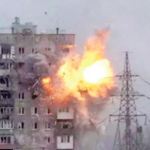It is amazing how similar the outcomes of World War I and the Cold War are. Indeed, how similar the military and political realities are.
Let’s simplify the picture: In World War I, it was Germany and Austria-Hungary against the West (with Russia falling out of the picture toward the end of the war). It was the German world (Germany was almost 100% ethnically German, while in the Habsburg monarchy the German element was in the minority but still dominated the whole country) against France and the Anglophere, i.e. the United Kingdom, the United States and Canada.
During the Cold War it was the Soviet Union and its satellites against the West, again mainly the Anglosphere. The Soviet Union corresponded in this comparison to Germany in that it was basically a Russian state (including Russian-speaking Ukrainians and Belorussians), while the countries of the Warsaw Pact corresponded to the Austria-Hungary or Dual Monarchy.
The two political and military camps – the German dominated Europe as opposed to the West, and the Russian dominated Europe as opposed to the West – vied for dominance. The hostilities during World War One brought about the weakening of the German-dominated alliance juts as the peaceful rivalry during the times of the Cold War brought about the weakening of the Soviet or Russian dominated part of the world. Talks were brokered, the warring parties sat at the negotiating table and slowly but surely a peace deal was worked out: Germany trusted its military and political adversaries would settle the post-war relations in a chivalrous way; so did the Soviet Union with regard for the victorious Western world. What happened next?
In the case of Germany the West – especially France – inebriated with victory began to step up demands and multiply acts aimed at humiliating yesterday’s enemy; precisely the same happened in the aftermath of the Cold War: the West – especially the United States – inebriated with its victory over the Soviet Union began stepping up demands and humiliating Russia, the core of the former Soviet Union. After 1918, Germany was forced to pay enormous contribution to the victors, cede chunks of territory and generally subjugate itself to the diktat of yesterday’s enemies. After 1991, Russia as heir to the Soviet Union lost huge chunks of territory (Ukraine, Belarus, the Baltic States, the Caucasus and the central Asian republics) and experienced a financial and economic plunder comparable to what Germany had gone through after World War One. What was the result in both countries?
An economic crisis that played havoc with the cohesion of society and a lingering sense of being humiliated and cheated. Yes, cheated, because the winning nations went back on their promise of jointly creating a better, peaceful world and only sought dominance and exploitation. The ten or so years of the Weimar Republic and the ten or so years of the presidency of Boris Yeltsin have much in common: both states found themselves at the mercy of the winning powers, both states were immersed in economic and political crisis, and both nations felt disillusioned with democracy made by the West. The result?
The result was in either case roughly the same: in the early 1930s in Germany and in the early 2000s in Russia, a strong leader emerged and gained popular support: in either case the strong leaders succeeded in first alleviating and then eliminating the economic, social, and political crises, and in either case both strong leaders managed to slowly restore the international high standing of their respective countries. In either case, the West’s relentless drive to expand its dominance eventually entailed war.
For all the approximations, the similarities are striking, are they not?




